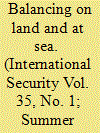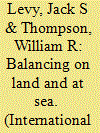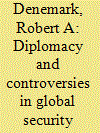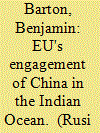| Srl | Item |
| 1 |
ID:
097752


|
|
|
|
|
| Summary/Abstract |
Scholars often interpret balance of power theory to imply that great powers almost always balance against the leading power in the system, and they conclude that the absence of a counterbalancing coalition against the historically unprecedented power of the United States after the end of the Cold War is a puzzle for balance of power theory. They are wrong on both counts. Balance of power theory is not universally applicable. Its core propositions about balancing strategies and the absence of sustained hegemonies apply to the European system and perhaps to some other autonomous continental systems but not to the global maritime system. Sea powers are more interested in access to markets than in territorial aggrandizement against other great powers. Consequently, patterns of coalition formation have been different in the European system and in the global maritime system during the last five centuries. An empirical analysis demonstrates that counterhegemonic balancing is frequent in Europe but much less frequent in the global system. Higher concentrations of power in the global system lead to fewer and smaller rather than more frequent and larger balancing coalitions, as well as to more frequent and larger alliances with the leading sea power than against it.
|
|
|
|
|
|
|
|
|
|
|
|
|
|
|
|
| 2 |
ID:
097753


|
|
|
|
|
| Publication |
2010.
|
| Summary/Abstract |
Scholars often interpret balance of power theory to imply that great powers almost always balance against the leading power in the system, and they conclude that the absence of a counterbalancing coalition against the historically unprecedented power of the United States after the end of the Cold War is a puzzle for balance of power theory. They are wrong on both counts. Balance of power theory is not universally applicable. Its core propositions about balancing strategies and the absence of sustained hegemonies apply to the European system and perhaps to some other autonomous continental systems but not to the global maritime system. Sea powers are more interested in access to markets than in territorial aggrandizement against other great powers. Consequently, patterns of coalition formation have been different in the European system and in the global maritime system during the last five centuries. An empirical analysis demonstrates that counterhegemonic balancing is frequent in Europe but much less frequent in the global system. Higher concentrations of power in the global system lead to fewer and smaller rather than more frequent and larger balancing coalitions, as well as to more frequent and larger alliances with the leading sea power than against it.
|
|
|
|
|
|
|
|
|
|
|
|
|
|
|
|
| 3 |
ID:
165321


|
|
|
|
|
| Summary/Abstract |
In this work we identify elements of diplomacy as mechanisms with which to sharpen our understanding of security studies and weigh some claims regarding conflict. Diplomatic considerations have long been out of fashion in the field of global politics, and we seek to re- introduce them. In so doing, we situate ourselves within the general context of Goddard and Nexon's reformulation of security studies. We then identify two controversial questions in the security studies literature and consider them with reference to diplomatic interactions. The first of these is the argument raised by Jack Levy and William R. Thompson suggesting that great sea powers generate different balance of power dynamics than great land powers. We find support for the majority of their suggestions. The second controversy, closely associated with the work of T.V. Paul, concerns ‘soft balancing’ and arose to help explain the lack of balancing behaviors relative to the unipolar position of the United States after 1989. Soft balancing is controversial in part because identifying it requires us to understand the specific intent of various foreign policy actions. We use diplomatic activities to address the problem of intent, and find support for soft balancing in the diplomatic record.
|
|
|
|
|
|
|
|
|
|
|
|
|
|
|
|
| 4 |
ID:
124741


|
|
|
|
|
| Publication |
2013.
|
| Summary/Abstract |
The EU and China may strike observers as actors with fundamentally different political and normative outlooks and thus unlikely partners in international security. Yet, Benjamin Barton argues, the international fight against piracy in the Indian Ocean has provided them with the opportunity to forge a more collaborative relationship in the realm of maritime security. Their convergence on counter-piracy may also provide interesting lessons with regard to Europe's broader strategic engagement of China.
|
|
|
|
|
|
|
|
|
|
|
|
|
|
|
|